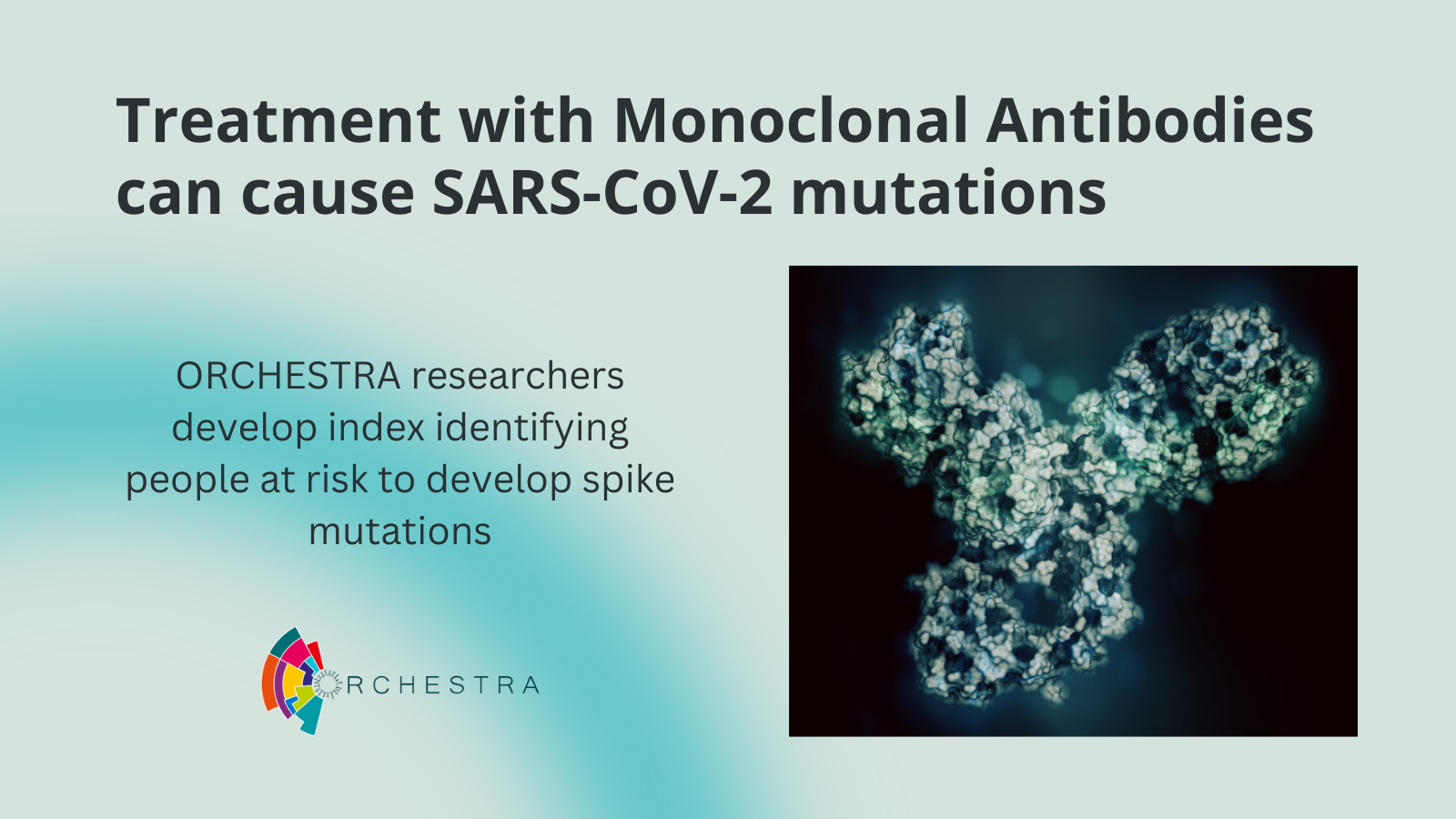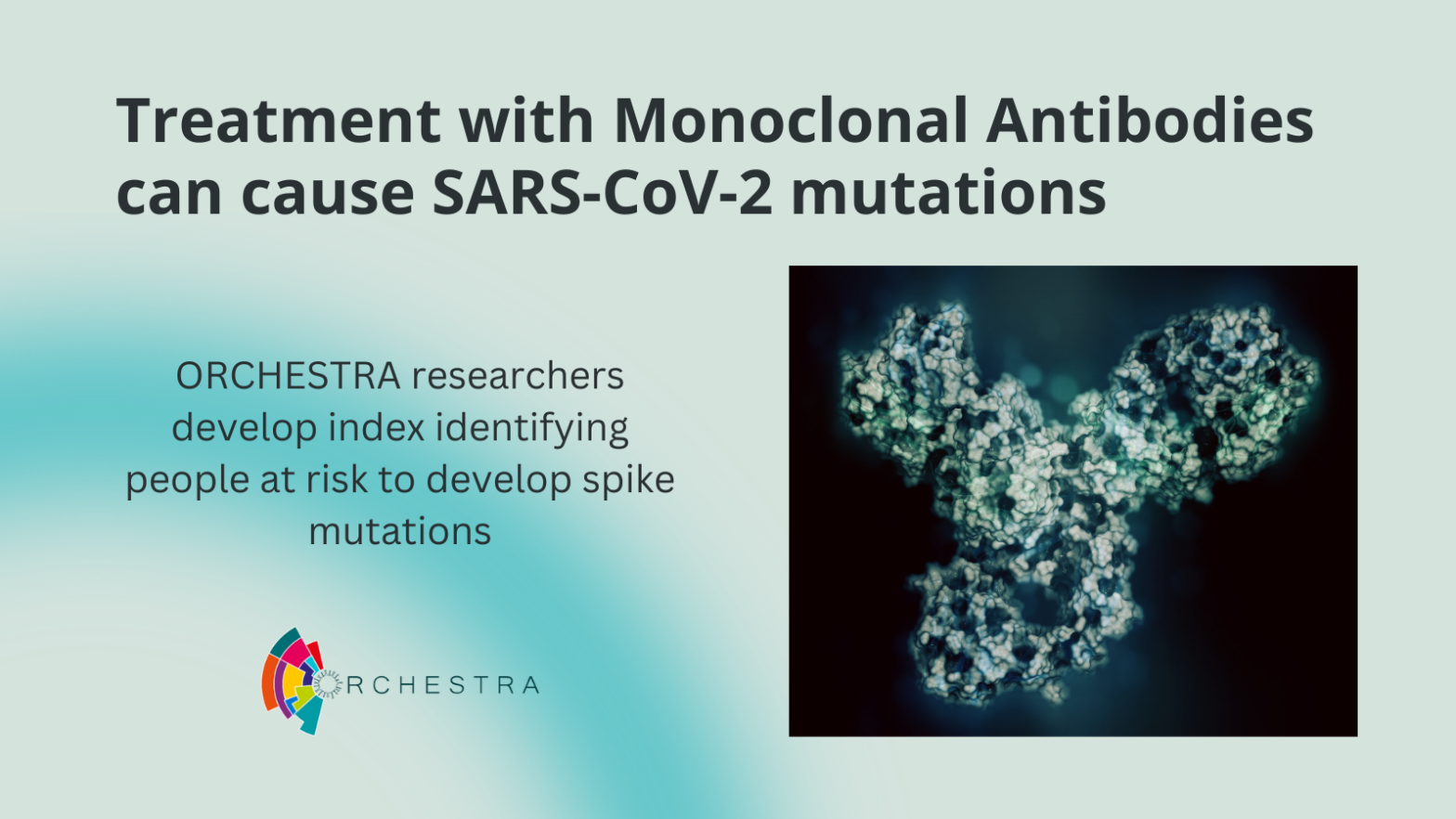Treatment with Monoclonal Antibodies can cause SARS-CoV-2 mutations – researchers develop score identifying patients at risk

Please find the original publication here: https://doi.org/10.1172/JCI166032
“Host immunological responses facilitate development of SARS-CoV-2 mutations in patients receiving monoclonal antibody treatments” is a study showing several remarkable findings: Patients receiving monoclonal antibody (mAb) treatments for COVID-19 can develop mutations in the virus, and an anti-inflammatory and pro-healing environment in the body can also cause mutations. Furthermore, the scientists developed a score identifying patients at risk for developing mutations in SARS-CoV-2 due to treatment with mAbs. The research was conducted in a collaborative effort within Work Package 6 lead by the University of Antwerp, Belgium, and Work Package 2 lead by the University of Verona, Italy.
What is the specific research question?
The problem of antibiotic-resistant bacteria is a major concern for healthcare systems around the world, affecting both developed and developing countries. The spread of these bacteria in communities has caused serious harm. Even as the COVID-19 pandemic continues to become endemic, there is growing concern that the virus causing the disease, SARS-CoV-2, may change and become resistant to treatment with monoclonal antibodies (mAbs). If this were to happen, it would not only affect individual patients but could also lead to the spread of mutated strains in the environment. It is important that steps are taken to prevent this from happening.
What is the specific use of mAbs?
Monoclonal antibodies (mAbs) offer a treatment option for individuals at high risk of developing severe COVID-19, and for whom vaccination does not offer optimal protection. For instance, immunosuppressed patients such as those receiving cancer treatment or organ transplant are unable to mount a sufficient antibody response to vaccination. MAbs have the ability to provide an immune response to a specific virus variant that the individual has not been able to generate on their own.
What is this study about?
In a clinical trial conducted at the University of Verona, led by Prof. Evelina Tacconelli, Director of the Infectious Diseases section of the University of Verona and Coordinator of ORCHESTRA, biological samples were collected from high-risk patients with COVID-19 who were treated with different mAbs. Viral variant analysis performed at the Laboratory of Medical Microbiology, University of Antwerp, led by Prof. Surbhi Malhotra, showed that approximately 8% of mAb-treated patients developed evasive SARS-CoV-2 spike mutations with remarkable speed and high specificity for the targeted mAb binding sites. While most patients cleared the virus over time, immunocompromised patients had significantly higher viral loads for prolonged periods and had 3-fold higher chance to develop SARS-CoV-2 escape mutations.
The researchers of the Laboratory of Prof. Samir Kumar-Singh, Director of the Molecular Pathology Group, Laboratory of Cell Biology and Histology, University of Antwerp, studied how the body’s immune system affects the way the SARS-CoV-2 virus changes, not only in people with weak immune systems, but also in people with normal immune systems. They found that changes in the virus, called escape mutations, can be caused not only by the treatment with monoclonal antibodies (mAbs), but also by the body’s entire immune system, including cellular immunity and circulating immune and growth factors-related biomarkers (CIB). CIBs are substances found in the blood that provide information about the immune system and its function. The markers can indicate how the immune system is responding to an infection or disease and can help predict the outcome of treatment. This information can be obtained by measuring the markers in the blood at the start of treatment.
The researchers were able to create an index using these markers (CIB-Index) to predict which patients are at high risk of developing mutations. The index performs with a remarkable accuracy rate of over 96%. This breakthrough could significantly improve patient outcomes and help reduce the spread of the virus.
What exactly is the CIB index designed to help with?
The CIB-index that the authors identified could help with point-of-care decision to reduce the risk of mAb treatment failure and allow patients to receive other treatment options such as antiviral treatments or convalescent plasma. Even if patients have already received mAb therapy, knowledge of this CIB index can still improve strategies to avoid possible spread of SARS-CoV-2 escape mutants, especially to people at high-risk in the same clinical or close contact setting.
Was there anything unexpected or surprising found in the study?
“It was intriguing to see that not only the mAb neutralising capacity and host immunity, but also host-healing responses played a crucial role in development of SARS-CoV-2 escape mutants”, says lead author of the study Prof. Samir Kumar-Singh.
Who, which patient group, benefits the most from the study?
The group of patients we call the “fragile population” will benefit the most. Doctors will be able to tailor their treatment to the specific risks. In addition, the findings will lead to a better understanding of the impact of the host’s healing environment on the development of spike mutations, which will also inspire further studies on how to avoid mutations and on which treatments might be more beneficial.
What is the main value of the study?
“The study provides innovative data to select high risk patients for early treatment. We believe this will reduce not only COVID-19 mortality but also Long COVID”, says Prof. Evelina Tacconelli.
###
